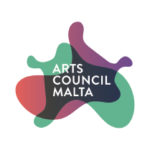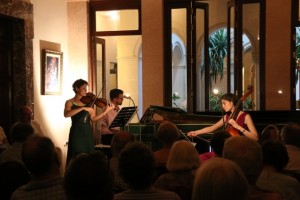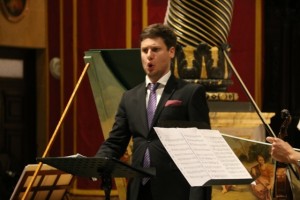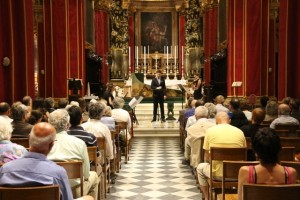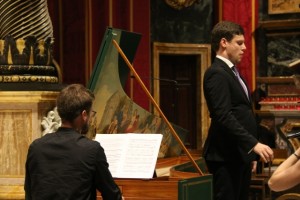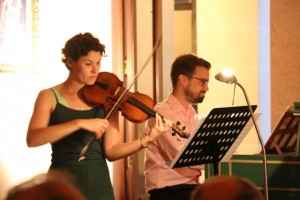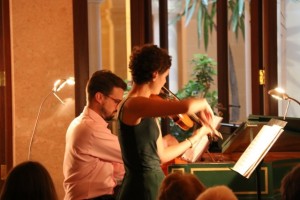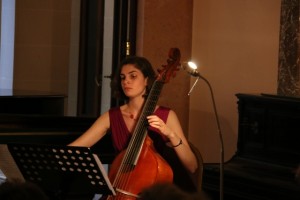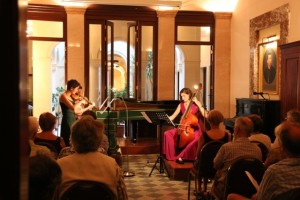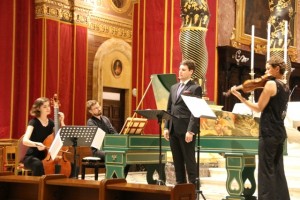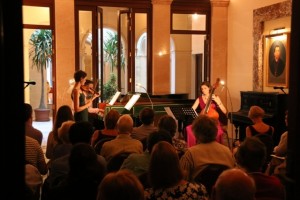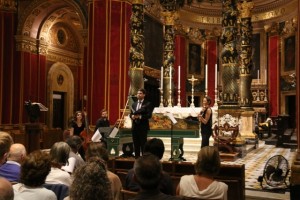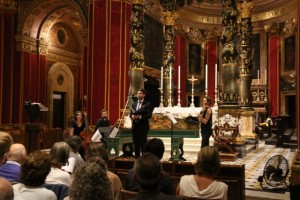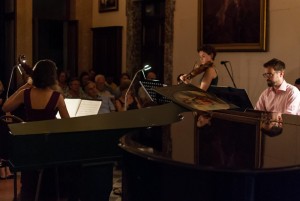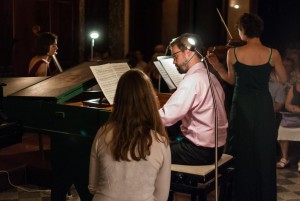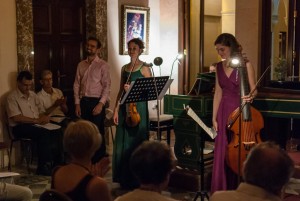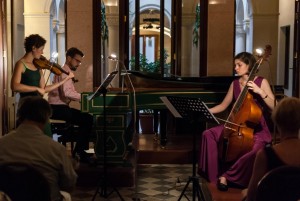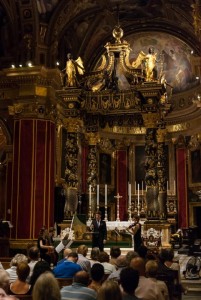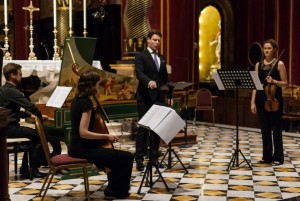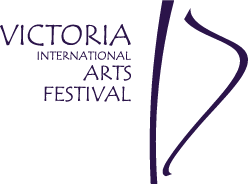Sophisticated and refined Musica Poetica London in two wonderful concerts
Musica Poetica London is a Trio of 3 very talented musicians who specialize in the Baroque repertoire. Technically most accomplished, they regaled two packed houses on two consecutive days with two entirely different programmes. The first one was devoted to ‘Bach and his Contemporaries’, while the second one saw them joined with up-and-coming, very promising young bass, Chris Webb, for an evening of elegant French music.
The first concert was held in the Aula Mgr G. Farrugia, and saw a record turn-out for what turned out to be a most exciting programme. Starting with one of Telemann’s numerous Trio Sonatas, namely, the Trio Sonata no. 10 in G Major TWV42, the ensemble made its mark with its assured reading of what is a deceptively ‘easy’ score. A little incident half way through the piece forced the ensemble to stop for a few minutes when the viola da gamba broke a string. This was soon set in place and the programme resumed calmly. The Trio manifested control, balance and a great rapport throughout.
Bach’s Sonata for Violin and Obligato Harpsichord no. 4 in C Minor BWV1017 is in the typical four-movement structure of the period. This Sonata is, stylistically-speaking the most unusual and forward-looking. While its four movements are plainly of the traditional church sonata lineage, two of them especially would have turned early eighteenth-century heads. Opening a four-movement sonata with a Siciliano, as Bach does here, is certainly unusual, if not necessarily groundbreaking; the swaying Sicilienne rhythm is given to the violin while the harpsichord ponders arpeggios. The content of the Adagio third movement, however, is so unusual for its time (c. 1717 – 1723) that one cannot but wonder at its creator’s inventiveness. Although one is in no doubt about Bach’s greatness, there is always that little bit more that one has not yet glimpsed, and this after 330 years of his birth. It is no ordinary Baroque chamber Adagio that provides the solo instrument’s melody with a constant triplet-arpeggio accompaniment in the keyboard right hand and a simple, streamlined bass line in the left ; indeed, the style of the accompaniment is more like something a composer half a century or more later might have concocted and in terms of apparent (though by no means actual) simplicity of design and texture, this movement is unrivalled in Bach’s sonatas. The remaining two movements – the two quick movements – are more standard Bach fare, although hardly less impressive. The second movement, Allegro, is the weightiest of all the violin/harpsichord sonata quick movements, while the finale, another Allegro, is the kind of dense, quasi-fugal binary movement one might expect of Bach. Claudia Norz on the Baroque violin mastered the difficult work with panache and confidence, while Oliver John on the harpsichord showed what a mature musician this young man is.
Of his many compositions, Graupner’s immense Chaconne in A Major GWV149 deserves special mention. This was the third piece on the evening’s programme. This series of variations on a four-bar bass line (actually the traditional passacaglia bass, with an added ‘en rondeau’ element of an opening theme repeated in the middle and at the end) comes at the close of one of the longest of the Partitas, which already has two of Graupner’s favoured final movements, namely, a set of variations and a Gigue. To add the Chaconne would elongate the Partita out of all proportion. The work clearly belongs to a South German tradition of monumental one-off Chacconnes and Passacaglie, and so, taking into account the compilatory nature of the source, it is more often played as a piece by itself. Standing alone, it is revealed as perhaps the most superb of all the many keyboard works of the genre, certainly the most flamboyant, the most extreme – in short, the supreme example of the Counter-Reformation. Oliver-John Ruthven on the harpsichord once again rose to the occasion and tackled this very difficult work with technical virtuosity and interpretative depth.
Bach’s Sonata for Viola da Gamba and Harpsichord in D Major BWV1028 performed by Kate Conway and Oliver-John Ruthven was next. The bass viol introduced a thematic fragment that is imitated by the harpsichord, and the following Allegrohad the two upper parts entering together, with more obvious imitation in the second half of the movement, in which the harpsichord is allowed to fill out some of the textures. The B minor Andanteis in the rhythm of a Siciliano, with the original key restored in the final 6/8 Allegro, with its variations in texture and figuration. A truly charming work, so elegantly performed.
The last item on Tuesday’s programme was another Trio Sonata, this time Telemann’s No. 6 in B Minor TWV42: h4. The Trio came together for this final work which started with a stately Largo, moving at a sober pace and largely built around a melody with supporting harmonic textures. It led on to the first of two quick movements, a Vivace. Here, the writing became increasingly more complex and contrapuntal, pursued by a moment of respite with the second slow movement, this time marked Dolce. This piece came across as extremely lyrical in the singing voice on the violin, which engaged in exchanges with both the harpsichord and the Viola da Gamba. The final Vivace was once again a busy and boisterous movement, technically demanding and requiring perfect equilibrium amongst the three instruments in terms of tone and dynamics.
A resounding round of merited applause greeted Musica Poetica London at the end of this concert.
The following day, Wednesday 24th June, the Trio performed again, this time in the hallowed ambience of the wonderful Baroque church of St George’s. In the full splendour of these spaces, a most elegant and refined concert of French Baroque music unravelled, to the delight of the numerous patrons that once again came to enjoy an evening of truly special music-making.
This time, Musica Poetica London were joined by very promising young bass, Chris Webb, who had the most difficult task of tackling three of the more challenging Cantatas composed in the seventeenth century. Starting with Jean Philippe Rameau’s Thétis, the bass immediately made his mark as a wonderful, accomplished performer, despite his obvious young age. Selling his part with the confidence, wit, and assurance that must perforce accompany such tour-de-force pieces, this was one accomplished performance. This must have been the first time that this work was heard on the islands and it came across with the idiosyncratic characteristics of the robust seventeenth/eighteenth centuries – strength, vigour, balance, directness and clarity.
The second Cantata that Chris Webb sang for us was this time by Louis Nicolas Clérambault, La Mort d’Hercule. In fact, the thematic understanding of this evening’s concert was ‘Myths and Legends from the French Baroque’, and this was attested by the fact that the three major works performed during the evening all concerned a narrative from ancient Greek mythology. This hauntingly beautiful Cantata was delivered as a most striking work for its expressive qualities but also for the rhythmic boldness borrowed from its Italian counterpart. In fact, in the arias, it is more particularly of Vivaldi that one thinks, when the violence of the elements and of passions are unloosed. Webb’s performance was again supremely polished, while the instrumental ensemble played intelligently and balance was maintained throughout, never for moment overpowering the singing voice.
The third and last Cantata of the evening was once again by Rameau, this time Aquilon et Orithie. A devilishly difficult work, with all but coloratura passages for the bass and stretching the gamut of the vocal register, not to mention the more endearing arias and some of the interludes for the ensemble which engaged in passages of breakneck speed, this brought a most special and unique concert to a close. In between the three Cantatas, the bass got a well-deserved respite when the Trio performed two lovely Trio Sonatas by Couperin and Louis Antoine Dornel.
Musica Poetica London and bass Chris Webb gave two performances that showed them at the top of their game. Articulation, clarity, dynamic sensitivity, impeccable phrasing (both vocal and instrumental) – these were the characteristics of the two concerts. We hope for further collaboration with the ensemble!

